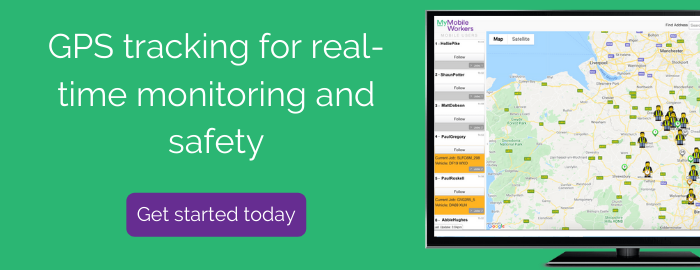What is GPS vehicle tracking, how does it work and what are the pros and cons for a business looking to use the technology? Let’s take a look:
What is GPS tracking?
Global Positioning System (GPS) is a method of working out exactly where something is. To achieve this, it uses a satellite-based radio navigation network that was developed by the US Department of Defence.
Despite being developed for military usage, it’s now used throughout the globe for a wide range of civil uses. This includes companies who use GPS tracking to monitor the movements of their mobile workers.
How does GPS tracking work?
Global Positioning System uses a network of 31 satellites that continually transmit time and location messages. A GPS receiver, such as a smartphone, will use the signals from four different satellites to calculate its location.
The general accuracy of GPS is within five meters when relying solely on satellite data. This is improved to within one-meter accuracy when extra signal sources are used such as using data from mobile phone towers.
With the use of software, such as a mobile workforce management system, the location and movement of a company’s vehicles can be tracked over time.
What are the pros of GPS vehicle tracking?
- Real-time monitoring
- Cost-effective
- Worker safety
- Customer/client communications
Tracking the movement of commercial vehicles is one of the most common uses for GPS. Here’s why:
Real-time monitoring
It takes around 1/15th of a second for a GPS signal to be pinged down from a satellite. It allows the movement of vehicles to be accurately tracked in real-time.
For a mobile services company, it transforms the way that road-based workers can be monitored and managed. Without GPS, an operations manager has little way of knowing where each employee is, with frequent calls, emails, texts.
Cost-effective
There’s no charge to use a GPS service and any kind of consumer phone can be used to track the movement of a mobile worker. If map data is preloaded on a device, tracking incurs no costs.
Any potential costs will come from the software and services that are required to make use of the GPS data. This will range from free apps to fleet management solutions.
Worker safety
Being able to monitor vehicle movement provides some significant health and safety benefits. It allows potential problems to be identified, such as an active vehicle stationary for a long time.
In the case of an accident or breakdown, it allows assistance to be sent to the location. Use of route planning also helps drivers to avoid potential hazards such as congestion, road closures and accidents.
Customer/client communications
GPS tracking greatly improves the quality and accuracy of the information that’s provided to customers and clients. Accurate arrival times and schedules can be created using real-time data.
There’s also the option to allow customers to access the information themselves with an online portal providing location and status updates.
What are the cons of GPS vehicle tracking?
- Signal consistency
- Over-reliance
- Tracking concerns
- Driver distraction
Like any technology, GPS tracking is not perfect and there are some issues to be aware of:
Signal consistency
To receive a satellite signal, a GPS receiver needs a clear line of sight. Anything that blocks the signal can cause problems, with erratic data and inconsistent service.
The potential barriers include buildings, trees, tunnels and mountains. With the number of satellites available and additional checks able to be carried out with phone infrastructure, these kinds of problems are usually only temporary.
Over-reliance
With the growing use of GPS for navigation and scheduling, there’s a danger that mobile workers become too dependent on their devices. When the systems are working, everything is okay but what happens if there’s a problem?
As a back-up, it’s hard to beat a street map and the ability to find a location in an old-fashioned way. Pre-checking a route can also help guard against the occasional quirks of GPS navigation - sending you down unsuitable roads.
Tracking concerns
When GPS tracking began to become commonplace, there were some concerns about this being another step towards a ‘surveillance society’. Over time, these issues have faded as GPS tracking becomes accepted as a norm in many aspects of our lives.
Care needs to be taken, however, to ensure ‘buy-in’ from a mobile workforce. Management needs to be open and transparent about how and why data is being collected and to comply with all the data privacy requirements.
Driver distraction
Managers of mobile workers need to make sure that employees are not distracted by their GPS devices when on the road. While navigation systems provide audio directions, risks are created if a driver tries to add or edit on-screen information.
Properly mounted devices, hands-free operation and safety policies which cover how and when GPS devices can be used can help reduce the risks.
You can find more information on how your business can benefit from GPS tracking here.

